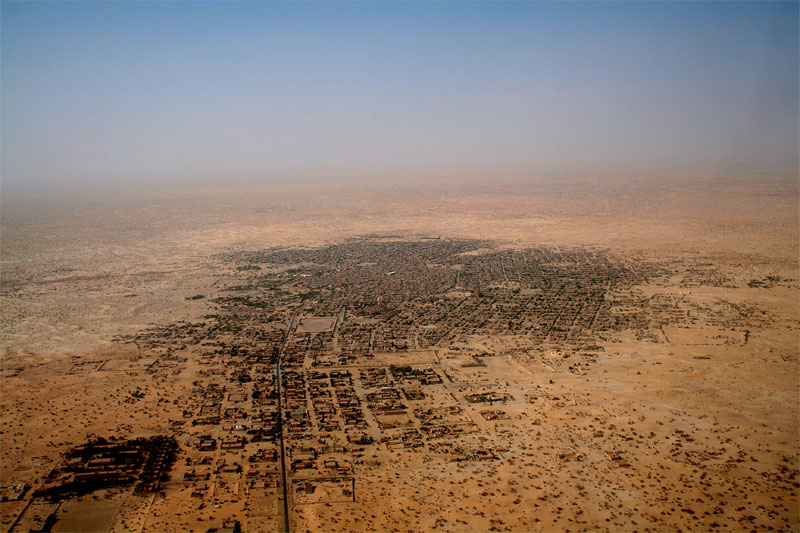I have a personal interest in Timbuktu (see blog for Mar 7, 2006), so I have followed, as best as I can, the recent events in Mali that affect it. After the fall of Gaddafi’s regime, several hundred young Tuareg who had been serving as mercenaries in his army have returned to Niger and Mali. Along with them came a large stock of weapons. This re-ignited the low-level civil war which had come to an apparently satisfactory peace settlement in 2009. Disatisfaction with the response to this renewal of violence seems to have triggered a coup d’état by the country’s military against the democratically elected government. As a consequence of the instability following the coup, the “National Movement for the Liberation of Azawad” (MNLA) quickly occupied the three largest northern towns (Gao, Timbuktu and Kidal) and declared an independent state of Azawad, cleaving away the thinly populated northern half of Mali.
Few events in the last few years have depressed me as much. Mali had lifted itself by its bootstraps from an intensely repressive Marxist dictatorship, heavily involved in the slave trade, to become West Africa’s most promising democracy. Now that promise is evaporating.
The population of Timbuktu is overwhelmingly ethnic Songhai (unrelated linguistically or ethnically to the Tuareg). There was once a substantial Tuareg minority in the city, but most left during the civil war. The Bambara, the principle ethnic group of Mali, inhabit the far south, and were never present in Timbuktu in significant number. Ali Farka Touré (1939–2006), the guitar player of genius, and perhaps the kindest and most humane figure of the region, was of ethnically mixed parentage, and performed in both the Songhai and Tuareg languages, as well as French. As the uncorruptable mayor of his native village, as well as an internationally renowned artist, he was the living symbol of peace, inter-ethnic collaboration, and democracy in Mali. He was at the heart of the extraordinary musical renaissance that emerged in Mali, hand in hand with democracy. In a way, I’m glad that he died without having to witness this devastating reversal of his life work.
The Tuareg in Mali have definitely legitimate grievances (there were abuses by the army during the civil war), but their situation has never been comparable to what it has been in neighbouring Niger. The renewal of fighting has more to do with very un-traditional Tuareg youth, de-culturalized, recruited into various armies and then cast loose looking for something violent to do, and with ambitious men looking for a new ideological power base on which to build their little empire. Many are cast-offs from Gaddafi’s thug army. The MNLA, however, is not necessarily in charge of its own rebellion. It has been increasingly forced to rely on an expedient alliance with the dangerous Islamist group Ançar Dine, which has connections to Al-Qaeda. This group has no motives (other than opportunism) that have anything to do with the people of northern Mali, or Tuareg or Songhai culture. They are dangerous fanatics. I suspect very strongly that they have already sidelined the original leadership of the MNLA (which is based in Gao), and are the ones who really control Timbuktu. Whatever their aims, the MNLA are demonstrably idiots for connecting themselves to them. They will soon learn that they have reaped the whirlwind.
Tuareg society is not a ready fit for the ideological Islamist movement. It is Tuareg males, not females, who traditionally cover their faces with a veil, and women have never been consigned to particularly subservient position. Both Tuareg and Songhai societies are nothing like the kind of pleasure-hating, fanatical self-hatred and barbarism that lies at the heart of the Islamist movement. But Ançar Dine’s power base is not support from any local people, whether Tuareg or Songhai, but the cash and ideological zealotry of an international movement. Their leader, Iyad Ag Ghaly, is a psychologically typical fraud: once well known for boozing and partying, he grew a beard and cosied up to jihadists while assigned by the Malian government as a diplomat to Saudi Arabia. You can be sure that the piety is phony.
You can also be sure that the people of Timbuktu are about to suffer. So will the cause of African democracy.
I also, understandibly, fear for the wealth of learning that might be destroyed. There are many thousands of books preserved there. The library of Sankoré University in Timbuktu was a great repository of books for centuries. It was founded in 988 AD with an endowment by a wealthy Tuareg woman, who wanted the city to have a seat of learning on par with the great urban centers of Islam. There were also many private libraries. Timbuktu was a major center of the Islamic book trade, often taking payment for exports in books. When the French conquered it, many leading families were afraid that the books would be stolen and carted off to Paris, so much of the collection was split up and hidden, with responsible families knowing the hiding places. I saw only a small sample of the huge total — they included many religious texts, of course, but also works on geography, chemistry, medicine, astronomy, and history. Among them are indigenous West African works and chronicles. The vast majority of these works have not been translated, and are only beginning to be catalogued and assessed. I presume this process has come to a halt, under the current political circumstances.
The new rulers of Timbuktu are not likely to have much interest in, or sympathy, with this glorious heritage.

0 Comments.